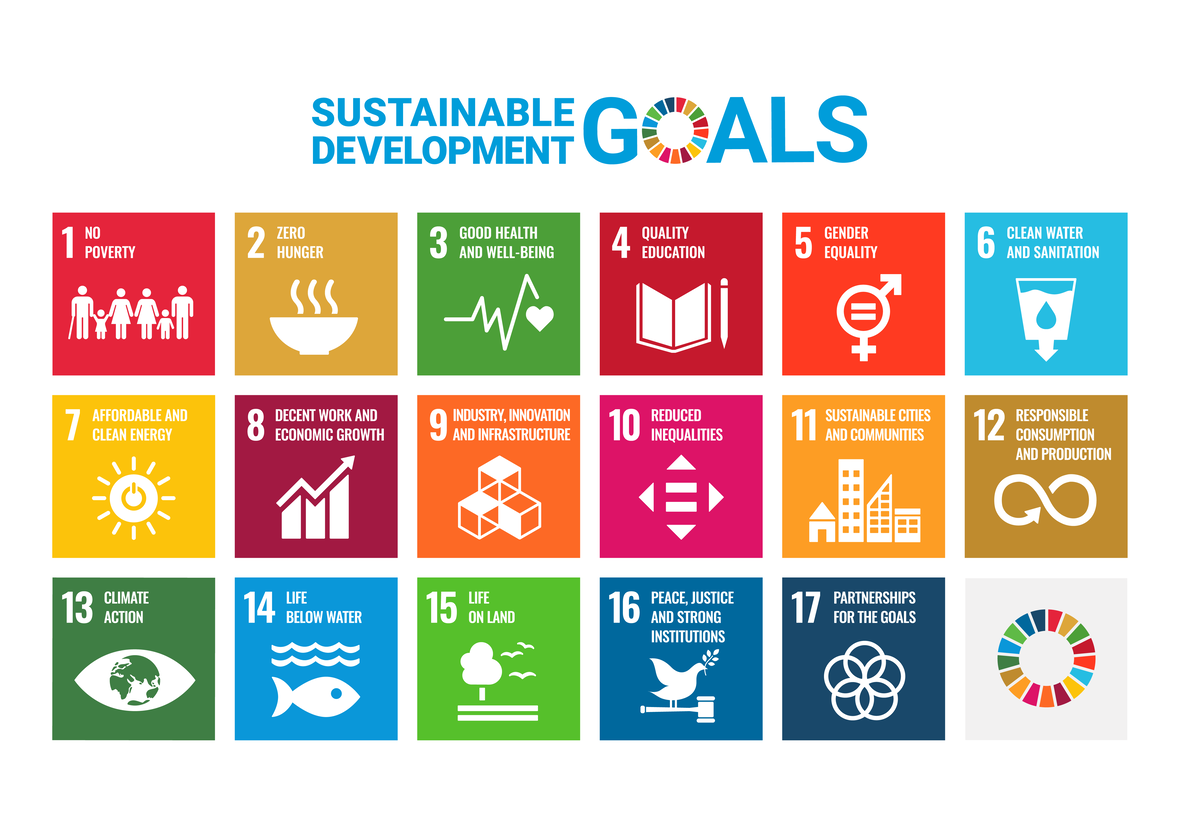Sustainability
Understanding of Sustainability and Guiding Principles
In the wake of the current climate debate, society's expectations of universities to do more for sustainability are rising. Many of these institutions are responding by intensifying their efforts in this area. One expression of this commitment is the increasing publication of sustainability reports, which provide transparent insight into the respective measures and progress made.
An important impetus for this action was the 2030 Agenda for Sustainable Development of the United Nations, which was adopted in 2015. This agenda sets out 17 Sustainable Development Goals (SDGs) that encompass social, economic, and environmental aspects. They provide global guidance and call on organizations such as companies, associations, and educational institutions in particular to align their actions with them.
The Heidelberg University of Jewish Studies also expressly supports the SDGs and is actively committed to their implementation. Particularly in the area of university organization, it is implementing concrete measures to contribute to the promotion of sustainable development and to fulfill its responsibility toward society and the environment.
The HfJS anchors a comprehensive commitment to sustainability in its core performance dimensions of research, teaching, transfer, and in the operation and organization of the university. The corresponding goals and measures are summarized concisely in the overview of the individual fields of action below and in more detail in the HfJS Sustainability Report.
Operation and Organization
Financial participation of the employer (50%) in the Deutschlandticket as a job ticket.
Approval of domestic flights only in exceptional cases.
Parking facilities for bicycles and e-bikes at the university.
Good accessibility of the facility by public transport.
Existence of an infrastructure for digital and hybrid events.
Possibility to work from home.
Teaching and Research
- Supporting researchers in their day-to-day work to organize their scientific activities in a resource-efficient, emission-reducing, health-conscious and socially sustainable manner.
- Pursuing the goal of reducing the ecological footprint of research activities without the orientation towards sustainability criteria leading to restrictions on the expected gain in knowledge.
- Knowledge about Jewish religion, culture and history should be made generally accessible and barrier-free and secured transparently for the future - for example by making academic information available online free of charge and by digitally archiving research data in the long term.
- Research should be made socially sustainable and structural discrimination counteracted.
- Recognition of diversity in the academic working environment as an important development goal.
- The HfJS actively strives to minimize its ecological impact in the area of teaching and learning.
- Developing measures that aim to design and implement teaching in a responsible manner that conserves resources and reduces emissions.
- Teachers create a learning environment in which they encourage inquiry-based and problem-based learning as well as critical thinking.
- Students are encouraged to develop empathy and self-reflection and are trained in dealing with complexity and ambiguity.
Albert Einstein Library of the HfJS
- Reducing inequality and injustice by providing assistance in using the library, searching for information and individual advice.
- Optimal support for all library users in their right to education.
- Its focus is on school teachers and the student body who, as the future generation, will further develop the goals for a fairer world.
- Promoting a sustainable, inclusive and democratic society through non-discriminatory access to information for all.
All users have unrestricted access to the library for reference use during opening hours.
For users with a library card, there is the option of borrowing and returning during opening hours, independently of service hours.
The library team provides support during service hours, including research and access to media.
Barrier-free access to the main level (ground floor) and the basement of the library areas; the library team provides support for additional requirements.
The library participates in the interlibrary loan; the taking interlibrary loan is given by the University Library of Heidelberg.
Implementation of introductory and training events, also as part of the course of study.
Teaching of information skills.
Digitization of old works no longer protected by copyright and making the digitized copies available free of charge to promote barrier-free access to infor-mation and knowledge worldwide and to ensure the preservation of individual tangible cultural assets.
Purchase from local booksellers who deliver on foot or by bicycle.
Delivery of information (books and articles) in digital form within the limits of copyright law.
Reuse of packaging material when sending media.
Use of ecological thermal paper for printing receipts.
Use of an electronic information system in library work (Confluence) for the library team.
Use of e-mails and messenger services.
Participation in interlibrary loan via the University Library of Heidelberg for shared use of the transport infrastructure.
New acquisitions: Acquisition of new and used literature.
Accepting bequests and donations.
Exchange of publications.
Planned switch to e-books.
Cancellation of print journals that are available digitally through the University Library.
All users have the opportunity to suggest acquisitions.
Donation of unneeded media and duplicates to interested users instead of dis-posing of the media.
Cataloging in the joint union catalog K10plus of the GBV and SWB.
External data transfer.
Cooperation with the FID Jewish Studies.
Collaboration with the University Library of Heidelberg on interlibrary loan, cat-aloging, acquisition agreements and training.
Membership of the Association of Jewish Libraries.
Cooperation with other institutions in the field of Jewish Studies.
Health
Students at the university can take part in the university sports program at Heidelberg University.
Employees at the university are offered annual G37 examinations and flu vaccinations. Furthermore, an annual inspection of the workplaces takes place to ensure that they meet health and safety requirements.
The company doctor is available to answer any health-related questions that employees may have.
More Information on Gender Equality and Internationalization.
Here you can download the sustainability report as a PDF file.


